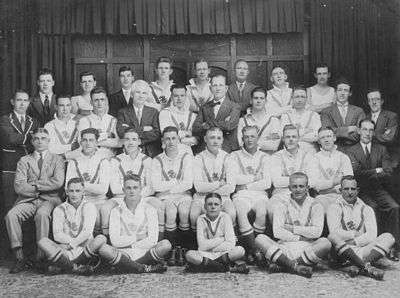Harry Flower
| Personal information | ||||||
|---|---|---|---|---|---|---|
| Full name | Harold Edwin Flower | |||||
| Born | 30 Oct 1900 [1] Sydney, New South Wales | |||||
| Died | 6 September 1970 Beverly Hills, New South Wales | |||||
| Playing information | ||||||
| Position | Front row forward | |||||
| Club | ||||||
| Years | Team | Pld | T | G | FG | P |
| 1922–30 | St George Dragons | 58 | 6 | 0 | 0 | 18 |
| Representative | ||||||
| Years | Team | Pld | T | G | FG | P |
| 1924 | New South Wales | 1 | 0 | 0 | 0 | 0 |
Harold Edwin 'Harry' Flower (30 Oct 1900-1970) was an Australian WWII veteran, a prisoner of war and a 1920s rugby league player in the New South Wales premiership competition with the St George Dragons.

Playing career
Born in Newtown, New South Wales, Harry Flower learnt to play rugby league at a young age and was also a great runner, running marathons with the Redfern and St.George Harriers clubs.[2] Originally a South Sydney junior and prop-forward, Harry Flower played eight seasons with St George Dragons during their foundation years between 1922 and 1930. He scored a try in the infamous Earl Park Riot match in 1928. His last game was the 1930 Grand Final against Western Suburbs Magpies.[3]
War service
Flower enlisted in the Australian Army as a 40-year-old during World War II and attained the rank of lance corporal. [4] He was captured and held by the Japanese as a prisoner of war, and survived. His 19-year-old son (Harry Edwin Flower junior) also served in the Australian Army and survived the war.
Harry Flower died on 6 September 1970, aged 69.[5]